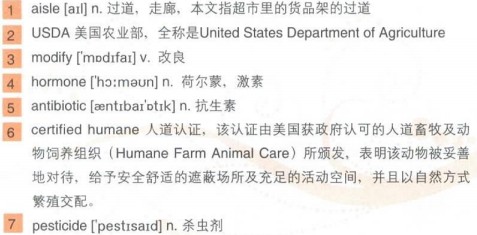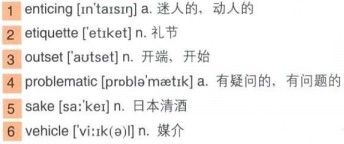有机食品知多少 What the "Organic" Label Really Means
语音:美式发音 适合泛听
语速:180词/分钟
关键词:organic, difference in price, pesticides  Reporter: If you’d walked into an average American supermarket about 20 years ago, you would have been hard-pressed to find an organic label anywhere. Now almost every 1)aisle has something labeled “organic.” The problem for consumers is figuring out exactly what does the label mean.
Reporter: If you’d walked into an average American supermarket about 20 years ago, you would have been hard-pressed to find an organic label anywhere. Now almost every 1)aisle has something labeled “organic.” The problem for consumers is figuring out exactly what does the label mean.
We caught up with New York University nutrition professor Marion Nestle to help us out.
When somebody’s buying something that says “organic,” like this, what should a consumer expect to be getting?
Marion: Well first, the consumer needs to look for this, which is the 2)USDA organic seal, which means that the production of these particular eggs has been overseen by the Department of Agriculture, by a certifying agency. It means that the chickens were fed organic feed, that the feed was not genetically 3)modified, that they were allowed access to the outdoors, that they weren’t treated with 4)hormones or 5)antibiotics.
Reporter: This chicken, “family farmed,” “grown without antibiotics,” I even see “6)certified humane,” but I don’t see “organic” on it.
Marion: It’s not organic! These chickens are not produced probably using organic feed…
Reporter: Right.
Marion:…and so they don’t meet the Department of Agriculture’s rules for certifying “organic.” But this is…
Reporter: So consumers have to be very careful: things like “natural,” “family farmed” don’t necessarily mean “organic.”
Marion: Absolutely do not necessarily mean “organic.” This is a step in the right direction, but it doesn’t go all the way.
Reporter: Right.
The next question is price, and I wanna come check out the bread. Everything is exactly the same except one’s organic, one has the seal and one’s not, and when I look at the price, there’s about a 60 cent difference in price, so I think to myself, “Should I pay the extra money? What am I really paying for?” Why are you paying more for “organic?”
Marion: Well, what you’re getting here is you’re getting grain that was grown without artificial 7)pesticides, and there’s just more labor that goes into it, and that’s what you’re paying for.
Reporter: Right. If someone can’t afford to buy all “organic,” what should they be concentrating on first? Where should they start?
Marion: I always say start with the berries because they’re the fruits that get the most pesticides, and they’re the one’s most likely to be pesticided. So we have two packages of berries here. This one is “organic” with the USDA seal on it; this one is not. They’re priced the same. I’d buy the “organic.”
记者:如果二十年前你走进一家普通的美国超市,你很难看到有机食品的标签。然而今天,几乎每家超市都有带“有机”标志的食品出售。这给消费者出了道难题:究竟这些标签意味着什么呢?
我们找来纽约大学的营养学教授马里恩·尼塞给大家支招。
当我们看到这种“有机”的标签时,我们买到的是什么呢?
马里恩:首先,消费者要找一下有没有这个标志,美国农业部的有机印章,这个印章表示这种鸡蛋已经通过了美国农业部的检验,由认证机构执行的检验,证明这些鸡吃的是有机饲料,而不是转基因饲料,这些鸡在户外长大,没有被注射激素或抗生素。
记者:而这些鸡标有“农家饲养”、“不含抗生素”,甚至是“人道认证”,但却没有标明“有机”字样。
马里恩:因为它们并不是有机产品!这些鸡也许并不是喂养有机饲料的。
记者:哦。
马里恩:因此它们并不符合美国农业部的“有机食品”的认证规定。但……
记者:因此消费者得留心了:“天然”和“农家饲养”等字样并不与“有机产品”直接挂钩。
马里恩:绝对是这样。它们朝着“有机食品”的方向努力了,但还不是有机产品。
记者:没错。
接下来的问题是价格,我要看一下这些面包的价格。标签上什么都是一样的,不过一个是有机食品,上面印有“有机食品”的认证印章,而另一个没有。我看了一下价格,他们相差60美分,因此我在想,我应该多付这60美分吗?我付这额外的60美分会得到什么?为什么我得为“有机食品”多付一些钱呢?
马里恩:嗯,这是因为你得到的这些面包来自没有添加人工杀虫剂的谷物,它们耗费了更多的人力,这就是你得多花钱的缘故了。
记者:原来如此。如果我们由于购买力所限,无法总是购买有机食品,那么我们应该注意买哪些产品,应该先从什么食品着手?
马里恩:我总是说从浆果入手,因为它们是受杀虫剂污染最大的水果,也是最有可能被喷洒杀虫剂的。我们这里有两包浆果,一个带有美国农业部认证的有机食物标志,另一个没有。它们的价格一样,我会买“有机”那一包。
新闻链接:有机食品的定义与由来
1939年,诺斯伯纳勋爵( Lord Northboume)在其著作《Look to the Land》中提出了organic farming(有机耕作)的概念,指整个农场作为一个整体的有机的组织,而相对的,chemical farming(化学耕作)则依靠了imported fertility(额外的施肥)。
这里所说的“有机”不是化学上的概念——分子中含碳元素——而是指采取一种有机的耕作和加工方式。有机食品是指按照这种方式生产和加工的、产品符合国际或国家有机食品要求和标准、并通过认证的一切农副产品及其加工品,包括粮食、蔬菜、水果、奶制品、禽畜产品、蜂蜜、水产品和调料等。

日本人的“生意经” Learn the Culture to Do Business in Japan
语音:美式发音 适合讨论
语速:175词/分钟
关键词:Japan, business etiquette, patient
 Half a world away, Japan is an 1)enticing business market. But small businesses that are considering doing business in Japan need to know business2)etiquette requires more than practicing a respectful bow.
Half a world away, Japan is an 1)enticing business market. But small businesses that are considering doing business in Japan need to know business2)etiquette requires more than practicing a respectful bow.
Adrian Stones (Lived and Worked in Japan for 14 Years): I think, at the 3)outset, you know, I did speak some Japanese, so I thought that was going to be sufficient to open a number of doors at a business level. It was not.
Dean Foster (Dean Foster Associates): I can’t think of two cultures that are more different than Japan and the United States in their business styles. And I think any American going to Japan really needs to understand the way the Japanese think about business in order to be effective with them.
First, know the proper greeting.
Foster: Hold your business card in a proper way, which means with two hands usually with the readable side facing the person you’re giving the card to.
Understand that the Japanese try to avoid conflict.
Foster: So if you ask to Nakasan, “Did you like the terms of the agreement?”, he’s going to say, “Yes, the terms of the agreement are very interesting. Perhaps a few things need some further study.” Well that’s his way of saying that he really doesn’t like the agreement at all, but he’s not gonna be direct about things that are difficult or 4)problematic.
Know there is a language barrier.
Stones: At a more sort of day-to-day personal level, using idioms is probably not a good idea: it’s very hard to translate. Jokes don’t translate so well either unfortunately.
Be social.
Foster: You want to get out there, you want to go to dinner, you want to go to karaoke, and at these times, this is where you’ll hear the real feelings come out. During the day it’s difficult to hear what they’re really thinking and feeling, particularly if it’s problematic. But over dinner, over some 5)sake, then they’re gonna lean over and they’re gonna tell you one on one what they really think.
Recognize that the Japanese like to make group decisions.
Foster:…so you shouldn’t go to Japan expecting meetings to be opportunities for making decisions. They’re not. They’re 6)vehicles by which you share information, and the decision comes back to you later after the whole team has had a chance to talk about it.
Stones: I just think you should do your homework and be patient. Things will never happen in Japan as fast as you think they will.
位于地球另一边的日本是个充满魅力的商业市场。不过,希望在日本发展生意的小企业就要知道,这个国家的商业礼仪绝非仅是毕恭毕敬的鞠躬而已。
艾德里安·斯通(在日本生活和工作了14年):我想,刚开始的时候,我确实能讲一点日语,因此我以为在做生意方面,那已经足够打开几扇大门了。但我错了。
迪安·福斯特(迪安·福斯特联合会):就商业风格方面来讲,我想不出有哪两个国家比日本和美国之间的差异更大的了。我认为任何一个想到日本做生意的美国人都要知道日本人经商的思维方式,以便更好地和他们打交道。
首先,你要懂得正确的打招呼方式。
福斯特:持名片的方法要正确,双手递名片,并且递名片的方向要让对方看得到名片上的字。
要了解日本人会避免发生冲突。
福斯特:如果你问日本人:“你觉得这个协议的条款怎么样?”他会说:“不错,条款非常有吸引力。也许有些地方需要再进一步推敲商榷。”其实,他要表达的意思是他一点也不赞同条款内容,但他并不会对有难度或争议的问题直接说不。
要明白会有语言障碍。
斯通:在日常生活的人际交流中,使用成语典故也许并不是个好的选择,因为它们很难翻译。笑话也同样是不容易翻译的。
参与社交活动。
福斯特:你要和他们有社交往来,一起去吃饭,一起去唱卡拉OK,在这些场合,你会听到日本人的真实心声。白天的时候,你很难了解日本人的真实想法和感受,尤其是对一些有争议的问题。但在饭桌上,几杯日本清酒之后,他们就会向你一一吐露他们的真实内心想法。
还要认识到日本人喜欢群体作决定。
福斯特:在日本,你不要以为会议就是作决定的机会。这不是他们的做法。会议只是交流信息的渠道,之后他们会集体商量讨论,过后再把决定向你反馈。
斯通:我认为你要预先做好功课,耐心一点。在日本,事情的进展远不如你期待中的迅速。

Comments 观点参考
Most communication in Japan is non-verbal. Be sensitive to the messages—you are sending out through your body language.
When speaking with someone, do not leave hands in pockets.
Do not lean against a wall or door.
Do not sit with the ankle over the knee.
Sit on the edge of a chair or sofa to show respect.
Touching is taboo in Japan.
Bowing is the common greeting in Japan. However, the handshake is becoming more popular, particularly among those who work with international guests and clients and among young people.
When is a smile not a smile? The Japanese smile to communicate various emotions: anger, embarrassment, sadness, and disappointment. Interpretation depends on context.
Eye contact is thought of as rude in Japan. They will often look down at their shoes or off in the air. Take care to not stare.
Silence in Japan is golden and is often used as a negotiating strategy.
